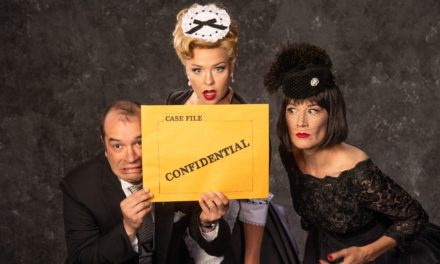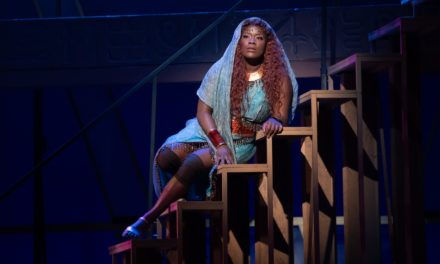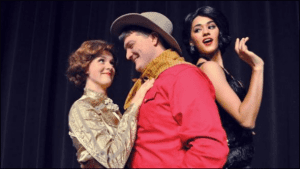 HOLLADAY — Harry Witherspoon is bored. All day long he sits in a shoe shop with no one to talk to but some Italian leather loafers. He wishes his life could be more exciting, more adventurous; instead, he is stuck with an overwhelming sense of ennui. One day, Harry receives a telegraph that his uncle Anthony, whom he has never met, has passed on. Harry is in line to inherit six million dollars. That is, if he can fulfill his late uncle’s every wish. Otherwise, the money goes to a charity for dogs. Harry must take his uncle’s corpse on vacation to Monte Carlo, order him bottles of Dom Perignon, and show him a smashing good time.
HOLLADAY — Harry Witherspoon is bored. All day long he sits in a shoe shop with no one to talk to but some Italian leather loafers. He wishes his life could be more exciting, more adventurous; instead, he is stuck with an overwhelming sense of ennui. One day, Harry receives a telegraph that his uncle Anthony, whom he has never met, has passed on. Harry is in line to inherit six million dollars. That is, if he can fulfill his late uncle’s every wish. Otherwise, the money goes to a charity for dogs. Harry must take his uncle’s corpse on vacation to Monte Carlo, order him bottles of Dom Perignon, and show him a smashing good time.
The show opens with a rousing number, “Something Funny’s Going On,” an expositional piece including the entire cast. It explains that there is something suspicious about Uncle Anthony’s passing. The cast, as a chorus, was very unified, with big voices and big choreography. The song itself is quite funny, and it is immediately clear that the audience is in for a good time. I’ve hardly ever had so much fun with death.
The next number is sung by our lead, Harry Witherspoon, played by Danny Eggers. This was, unfortunately, a show where the side characters outshone the lead, and Eggers was dwarfed by some of the performances from the rest of the cast. His obvious tenor range was not helped by the fact that the songs were simply too low for him, and music director Anne Puzey would have done well to change the key of some of the songs so that his voice wasn’t straining against the low notes. Eggers also plays a British man, and his accent was never consistent. I did notice, however, that Eggers was a very skilled dancer, and, despite the flaws in his performance, he also had a certain charm and relateable quality.
Playing across him as the romantic interest was Camee Anderson Faulk, the frigid representative of the charity for dogs, sent to follow Harry around and watch his every move. Faulk’s talent rose above most of the cast, being as she was the strongest singer. This was especially clear in her solo number, “Times Like This,” where she belted out a note that had the audience clapping before the song was even finished. She played her role of the uptight Miss Glick extremely well, with sharp comedic timing and a Shelley Duvall-like presence. I was especially tickled by the scenes where Miss Glick must follow Harry and Anthony’s corpse around to their varied activities, including a skydiving trip, fishing, (which featured Faulk “floating” around in an inner-tube, a delightful sight gag), and gambling.
Another notable performance was that of Chantelle Bender, playing Rita La Porta, ex lover and rightful—she thinks—owner of the six million dollars. Bender pulled off the role of the legally blind villain well, her New Jersey accent properly executed. Her singing voice was also very strong, and I was pleasantly surprised by her mezzo-soprano belt, particularly in the song “Fancy Meeting You Here.”
One performance, in my opinion, completely stole the show. It was that of J. Tyrus Williams playing Man 1. Williams played several characters in the show, including the attorney overseeing Anthony’s Will, a French lounge singer, an Italian nun, and a crotchety old Texan in a wheelchair. Williams played each role with gusto and impeccable accents. Every time he was onstage, his physical comedy and enthusiastic character acting dazzled.
Leading the cast along was director Nolan Mitchell. He seemed to understand the capacity of gifted actors in this town, and found some real gems. I can appreciate a director who knows how to cast well, and he pulled this feat off wonderfully. He also knew how to make use of a limited space, and, along with Darin Fitt, the set constructer, he built a set worthy of a much bigger stage. Panels and furniture went smoothly on and off the stage, making the scene changes flow quickly so as not to interrupt the brisk pace of the show. The attention to detail was obvious, and some of his creative choices very clever, such as the skydiving scene, which featured parachute straps hanging down from the stage rigging on both sides of the stage.
I was impressed with the production value of the show, despite its low budget. Every actor had a working microphone, and lighting and sound were done inventively by Luke Orton, with light rigs and speakers set up on either side of the audience. Though some microphones didn’t come on precisely when actors entered the stage, the sound was well done, particularly in the use of voiceovers, which came across loud and clear. The show also featured a live band, complete with piano, synthesizer, drums, and an electric bass. The band was a highlight of the show, performing exceptionally well, keeping up beautifully with the more rapid songs while not overpowering the voices of the actors.
Overall, I enjoyed this little production tucked away in the Holladay City Hall, a space I did not even know existed. The Murray Arts Council made a good choice in producing this witty musical written by Lynn Ahrens and Stephen Flaherty. I was not at all familiar with the show before I went to see it, and I rather enjoyed it, along with its execution by a talented cast and director.





